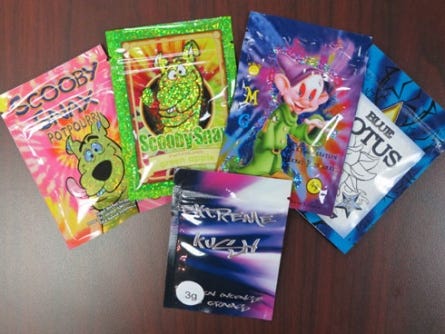
SHALIMAR — A slew of new synthetic drugs has been deemed illegal in the state of Florida, according to an emergency order the Attorney General issued Tuesday.
In response, deputies with the Okaloosa County Sheriff’s Office informed several local convenience stores and other shops that often sell the substances about the new bans and asked them to voluntarily hand over any of the banned merchandise.
“They can surrender (the drugs) or face enforcement action,” Sheriff Larry Ashley said at a news conference announcing the emergency order Tuesday afternoon.
The order makes it illegal to sell, manufacture, deliver or possess with intent to sell 22 substances classified as cannabinoids, cathinones and phenethylamines, according to a news release from the Office of the Florida Attorney General.
View a list of the banned substances.
The newly banned substances are designed to mimic the effects of drugs such as marijuana, amphetamines and LSD.
The so-called synthetic drugs are sold at convenience stores and head shops in packaging designed to appeal to young children and teenagers. The drugs are often labled as household products such as potpourri, bath salts or incense and labeled not for human consumption.
The packaging belies the real danger of the drugs, Ashley said.
“They’ve been linked to thousands of emergency room visits and it’s getting worse,” he said.
The substances are known to cause hallucinations, violent paranoid behavior and in one case, a man tried to eat the cage out of the back of a county patrol car, he said.
The state began banning the synthetic drugs in January 2011. At that time, the Sheriff’s Office began asking local retailers to voluntarily surrender their merchandise.
Since then, deputies in Okaloosa County have confiscated more than $1.8 million worth of the drugs and glassware or paraphernalia sold along with it, Ashley said.
They’ve made 56 controlled buys, served 22 search warrants and made three arrests.
In October, five head shops and the Bluewater Bay home of their owner, Patrick Anderson, were raided for the synthetic drugs.
No arrests were made in that case, but a federal investigation is ongoing, according to the sheriff’s office.
Even as law enforcement officials comb stores for the currently illegal substances, manufacturers are working to slightly alter the chemical makeup of the drugs to get them back out to the public, said Rep. Matt Gaetz, who attended the press conference.
“There’s always an overseas chemist with a new compound that we have to later come back and ban,” he said.
Officials are striving to stay ahead of the science, though, Gaetz said.
Phenethylamine, an obscure research chemical included in Tuesday’s ban, is available online, but is not yet commonly found in retail stores. Officials fear the presence of the drug may grow as other synthetic substances are banned, according to the Attorney General’s order.
As the newly appointed chair of the criminal justice committee, Gaetz said his first order of business will be to make the new bans a state law, rather than a temporary order.
Ashley said lawmen across the state would applaud any effort to help battle this chronic and growing issue.
“Law enforcement will not stand by and watch this poison be sold in our communities,” Ashley said.
This article originally appeared on Crestview News Bulletin: Attorney General bans additional synthetic drugs
